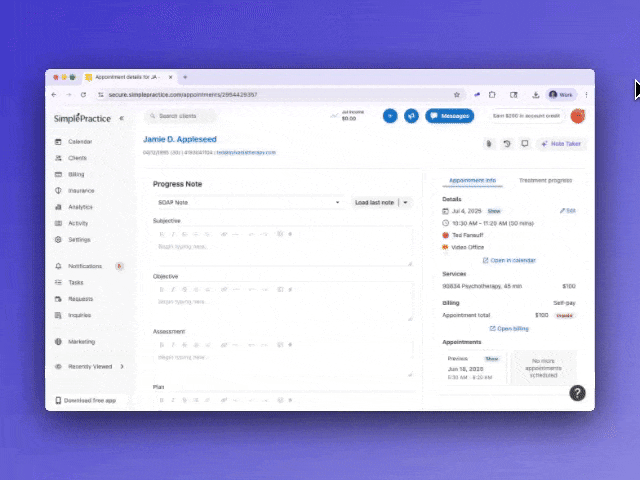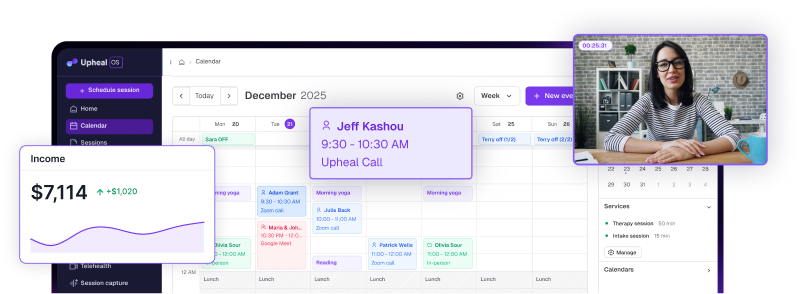5 best AI scribes for therapists [2025]
![5 best AI scribes for therapists [2025]](https://cdn.prod.website-files.com/6328c07d72b05347cc236c49/68a793e03141f5853f9bacf9_best%20ai%20scribe%20for%20therapists.avif)
The best medical scribes for therapists in 2025 are Upheal, Freed, Blueprint, Clinical Notes AI, and SimplePractice’s Note Taker.
But what makes them the leaders of the pack?
The hallmarks of a great medical scribe for therapists lie in three critical criteria:
- Pricing that works for practices of all sizes
- Capabilities that extend beyond basic transcription
- Flexibility to integrate seamlessly with existing workflows
Yet there’s a fourth criterion that trumps all others: privacy.
In an era where AI companies actively purchase therapeutic conversations to train chatbot replacements, choosing a platform with rigorous privacy standards isn’t just best practice — it’s essential for protecting both your clients and your profession.
What to look for in a medical scribe
Pricing
The financial reality of private practice demands careful consideration of both subscription and per-session pricing models.
- Look for platforms offering free features to test functionality
- Calculate your total monthly cost based on 25+ sessions per week
- Watch for hidden costs in per-session models, which can quickly exceed subscription alternatives for clinicians with moderate to heavy caseloads
Capabilities
Modern AI scribes should transcend basic transcription.
The most valuable platforms augment clinical care through intelligent features such as:
- Treatment planning that creates coherent therapeutic narratives
- Compliance checking that catches documentation gaps before audits
- Session analytics that reveal patterns invisible during real-time interaction
These capabilities transform documentation from administrative burden to clinical tool.
Flexibility
Your documentation system should adapt to your practice, not the other way around.
Whether through:
- Browser extensions that work with any EHR
- Direct integrations with major platforms
- The ability to populate properly-formatted notes anywhere
👉 Flexibility determines whether AI assistance enhances or disrupts your established workflows.

Privacy
In the current AI landscape, privacy extends far beyond HIPAA compliance.
Platforms must demonstrate:
- Explicit consent requirements for AI training
- Transparent data retention policies
- Absolute prohibition on selling session data — even in aggregated form
The criteria established in previous content on protecting your practice provide the framework:
- Opt-in consent
- Client control
- Prohibition on data sales
- Current privacy policies
- SOC 2 certification
- Clinician discretion in subpoena responses
Platform comparison
1. Upheal: Best overall
Upheal represents the convergence of clinical sophistication and privacy-first design. Built specifically for mental health professionals, it offers unlimited AI-generated notes completely free, with premium features starting at $19/month. The platform captures sessions in eight languages, generates insights through advanced analytics, and maintains the industry's strongest privacy stance with explicit opt-in consent requirements.
✅ What makes it the best
Upheal leads across all four criteria through a combination of:
- Accessible pricing (including unlimited free notes)
- Comprehensive capabilities (Golden Thread treatment planning + session analytics)
- Unmatched flexibility (Smart Fill browser extension + multi-language support)
- Privacy practices requiring explicit consent before any data touches AI training systems
Its SOC 2 Type II certification and commitment to never selling data — even aggregated — set the standard for ethical AI in therapy.
2. Freed: Good for multi-disciplinary teams
Freed brings medical-grade transcription capabilities refined across multiple healthcare specialties. At $90/month per clinician, it represents a significant investment that delivers proven reliability for practices serving diverse medical needs beyond behavioral health.
✅ Freed's strengths
- The platform's robust feature set, developed through extensive deployment across medical specialties, handles complex medical terminology and multi-disciplinary documentation with exceptional accuracy.
- Integration with hospital systems and medical EHRs makes it valuable for behavioral health professionals working within larger healthcare organizations.
⚠️ Cons of Freed
- The $90/month per-clinician pricing creates substantial barriers for solo practitioners and small group practices, potentially costing over $1,000 annually.
- More concerning, Freed's privacy practices allow default use of session data for AI training without explicit consent, and their terms permit selling aggregated data — transforming therapeutic conversations into commercial assets.
3. Blueprint: Good for patient privacy
Blueprint prioritizes rapid documentation with strong privacy protections, offering session-based pricing starting at $0.49 per session. The platform excels at creating clear documentation trails that satisfy regulatory requirements while maintaining ethical data practices.
✅ Blueprint's strengths
- Blueprint's privacy practices stand second only to Upheal, implementing uncommon protective measures that reduce therapist liability while supporting client autonomy.
- The platform explicitly prohibits data sales, maintains current privacy policies, and commits to notifying providers about subpoenas whenever legally permitted.
- Their Golden Thread feature connects treatment plans directly to progress notes, creating coherent therapeutic narratives.
⚠️ Cons of Blueprint
- Per-session pricing accumulates rapidly — a therapist seeing 25 clients weekly faces costs exceeding $50/month even at the lowest tier.
- The platform's focus on documentation speed over clinical depth means it lacks advanced analytics for therapeutic insights, pattern recognition, and professional development support that enhance treatment planning and progress tracking.
4. Clinical Notes AI: Good for basic needs
Clinical Notes AI provides straightforward dictation-to-note functionality at $15-50/month, appealing to therapists seeking efficient transcription without complex features. The platform emphasizes treatment plan continuity and simplified EHR integration.
✅ Clinical Notes' strengths
- Strong features for maintaining treatment plan continuity across sessions ensure documentation coherence.
- The platform's ability to generate notes from dictation and streamline EHR data entry reduces administrative friction for clinicians comfortable with voice-based documentation.
⚠️ Cons of Clinical Notes AI
- Limited transparency around data retention and usage policies creates uncertainty about how session information is handled.
- The platform's value proposition weakens at higher price tiers, where more sophisticated alternatives offer superior features for similar investment.
5. Note Taker: Good for SimplePractice users
SimplePractice's integrated AI medical scribe, Note Taker, offers seamless documentation within the existing SimplePractice ecosystem. For committed SimplePractice users, it eliminates the complexity of managing multiple platforms.
✅ SimplePractice's strengths
- The primary advantage lies in complete integration — therapists already using SimplePractice for scheduling, billing, and client management can add AI documentation without learning new systems or managing additional logins.
- Session transcription and note generation occur within familiar workflows.
⚠️ Cons of SimplePractice's Note Taker
- It isn't included in your SimplePractice subscription, costing an additional $10/month.
- Lack of clarity around how session data trains their platform's AI models raises significant privacy concerns.
- The deep integration that provides convenience also creates vendor lock-in, requiring therapists to remain fully committed to SimplePractice's entire tool suite with limited flexibility for practice evolution.
The best medical scribe is the one that is the best fit for your practice
The emergence of AI documentation tools represents both tremendous opportunity and serious responsibility.
These platforms promise liberation from documentation burden, but their handling of client data will shape both individual practices and our profession’s future relationship with technology.
The four criteria established here — pricing accessibility, clinical capabilities, workflow flexibility, and privacy protection — provide a framework for evaluation.
Yet privacy deserves special emphasis. In an era where venture-funded companies actively purchase therapeutic conversations to train AI replacements, choosing platforms with explicit consent requirements and transparent data practices isn’t just prudent — it’s essential for protecting the therapeutic relationship.
Experiment with these tools, but approach them as you would any clinical intervention:
- With careful consideration of benefits, risks, and ethical implications
- Testing platforms that meet your security requirements
- Comparing outputs against your clinical standards
Most importantly, choose partners who understand that efficiency without ethics isn’t progress.
👉 Ready to experience documentation that respects both your time and your clients’ trust?
Try Upheal free with a 14-day trial of its full feature set — no credit card required. Discover how privacy-first AI can transform your practice while preserving what matters most: the sacred space of therapeutic connection.











